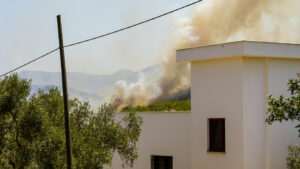The Hotel Industry and Climate Change
Texas is one of the most vulnerable U.S. states to climate change

The hospitality industry is particularly vulnerable to the effects of climate change. Rising sea levels threaten coastal resorts and hotels, snow melt affects mountain destinations, heat, and drought are changing eco-tourism.
Texas in particular is one of the most vulnerable U.S. states to climate change. Between 1980 and 2022, 44 percent of all billion-dollar climate and weather disasters (154 of 348 events) impacted Texas, including Winter Storm Uri (2021), Hurricane Harvey (2017), and the severe drought of 2011.*
Extreme weather influences tourist patterns, and Texas businesses are feeling the heat.
As hospitality emerges from the impact of the COVID-19 pandemic, climate change is the primary challenge facing global tourism. While the hospitality industry is vulnerable, it is also a major contributor to greenhouse gas emissions and has an important role to play in sustainable tourism practices.
The two most important climate change strategies for hotels are adaptation and mitigation. Here are some suggestions for both.
Adaptation
When our environment changes, we must change with it. Unexpected weather events from extreme heat, wildfires, drought, hurricanes, storm surges, and deep freezes are the new normal, and we must adapt ourselves and our businesses.
There are regional concerns, and there are common sense practices that apply to all.
Hotels in coastal regions should work with regional and/or federal authorities to invest in infrastructure that can withstand extreme weather events, such as seawalls, storm surge barriers, and coastal erosion planning.
Coastal properties need strong risk management systems in place including more expansive insurance and alternative revenue modules if unpredictable weather wipes out the high season.

West and South Central Texas are increasingly prone to drought and wildfire, causing significant losses to agriculture, and to other flora and fauna that are often attractions for visitors. Destruction of nature can reduce a property’s appeal and affect travelers coming for hiking, fishing, hunting, sporting events, rodeos, and other outdoor activities.
Droughts and water shortages make maintaining pools and other water features difficult. These catastrophic weather events can also increase the costs of sourcing local food and services.
Water stewardship is critical in these areas. Carefully calculate your water management with tools like this from Sustainable Hospitality Alliance. Develop drought-tolerant landscaping and invest in rainwater collection.
Flooding is increasing throughout the state, and with rapid climate changes, historic floodplain maps are no longer accurate. Re-evaluate your property’s flood plain position with the most current data and find out what your property needs to address.
All hotels must develop contingency plans to appeal to visitors and offset the potential loss of business in these circumstances.
Re-purpose underutilized spaces such as promoting garden areas for weddings, parties or events. Convert a hall or conference room to a yoga or exercise studio. Redress your hotel lobby as an inviting workspace, your coffee shop as a social gathering hotspot.
Mitigation
The hotel industry is energy-intensive, accounting for 3% of global greenhouse gas emissions. We have discussed these initiatives in previous articles, but they bear repeating. Here are some of the ways the hotel industry can help mitigate climate change:
- Invest in energy efficiency. Hotels can save energy with energy-efficient appliances, lighting, and HVAC systems. They can also improve the insulation of their buildings to reduce heat loss.
- Use renewable energy. Hotels can switch to renewable energy sources such as solar and wind power. This will help them reduce their reliance on fossil fuels and their carbon emissions.
- Reduce water consumption. Hotels can save water by installing low-flow fixtures, fixing leaks, and recycling water. They can also encourage guests to conserve water by using less water in showers and baths and reusing towels and sheets.
- Reduce food waste.
- Offset carbon emissions. Hotels can offset their remaining carbon emissions by investing in projects that reduce greenhouse gas emissions, such as planting trees or investing in renewable energy.
- Support sustainable tourism. Hotels can promote sustainable tourism by educating guests about the environmental impact of their travel and offering sustainable travel options.
The relationship between climate change and tourism has been the topic of debate for many years, but now there is consensus. In April 2022, The Glasgow Declaration on Tourism surpassed 500 signatories of global tourism businesses and stakeholders.
This is a catalyst for increased urgency about the need to accelerate climate action in tourism and to secure strong commitments to support the global goals to halve emissions over the next decade and reach Net Zero emissions as soon as possible before 2050.**
The hospitality industry must accept the reality of climate change, adapt their business models, and fight the tide of ever-evolving challenges at the same time. The cost of mitigating the environmental risk for the hotel industry is not something to consider, it is part of the cost of doing business.
References
https://www.pewresearch.org/2006/08/17/the-surprising-impact-of-global-warming-on-tourism/
https://link.springer.com/article/10.1007/s43615-021-00141-x

